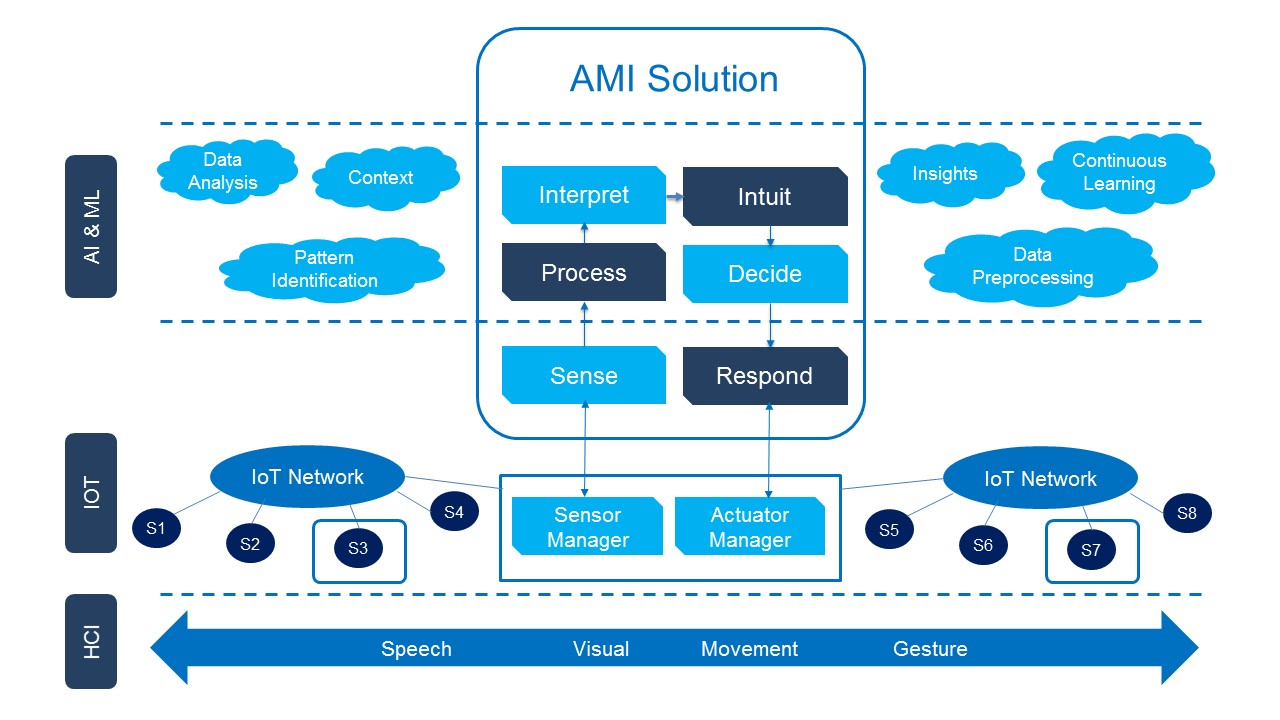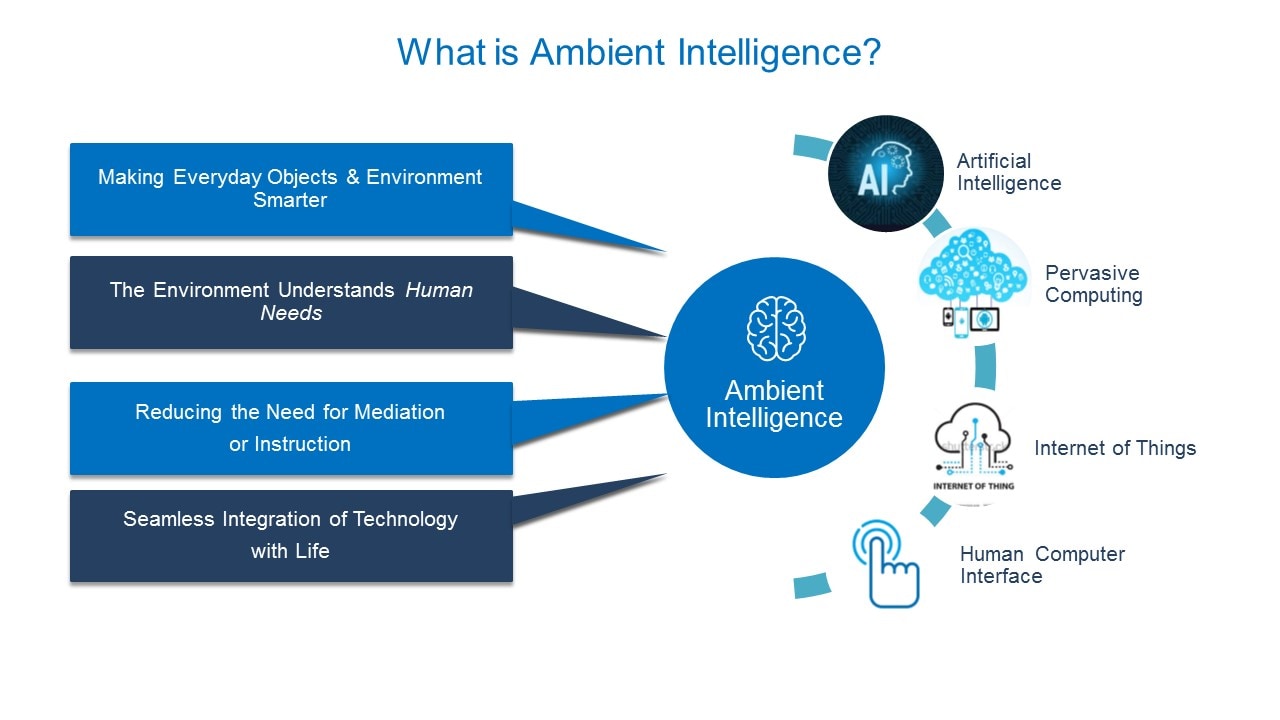AI/Automation
Living with Ambient Intelligence: So at Home with Technology
"The most profound technologies are those that disappear. They weave themselves into the fabric of everyday life until they are indistinguishable from it."- Late Mark Weiser, who was the chief scientist at Xerox PARC.
Redefining Human-Computer Interaction
True to Mark Weiser’s words, technology today has become all pervasive to the point of being ‘taken for granted’. Take for example our smart phones. They have become a ubiquitous part of our lives. Virtual personal assistants and Bluetooth speakers have become a subtle part of our background. While our lives have changed for the better with these technological innovations, we are poised for a much more dramatic disruption in our daily lives with what is known as ambient intelligence.
The upcoming disruption is driven by our quest to lead better lives, particularly if you consider that by 2050, the world’s population aged 60 years and more will most likely cross 2Bn. In the US, there will be 75% increase in the number of senior citizens needing assisted living. Imagine a digital home that proactively but sensibly supports people in their daily lives and provides the needed care for the elderly through human centric technology. We are poised for such a dramatic disruption in the way we live in our homes through ambient Intelligence.
Understanding Ambient Intelligence
Ambient intelligence (AmI) represents the future vision of intelligent computing where explicit input and output devices will not be required; instead sensors and processors will be embedded into everyday devices and the environment will adapt to the user’s needs and desires seamlessly. AmI systems, will use the contextual information gathered through these embedded sensors and apply Artificial Intelligence (AI) techniques to interpret and anticipate the users’ needs. The technology will be designed to be human centric and easy to use.
The ability of technology to take decisions and act on our behalf taking into consideration our preferences based on the data available to it from all the connected sensors and systems surrounding the user can be defined as Ambient Intelligence or AmI.
AmI is intelligent, pervasive, and intuitive. It does not ask the user but understands the user context. It does not make its presence felt but takes action that is tailored to the user’s preference. AmI is an emerging technology that is set to radically change the way we interact with machines and devices around us.
How Does Ambient Intelligence Work?
AmI is multi-disciplinary and works at the intersection of several technologies including Artificial Intelligence, Big Data, Internet of Things (IoT), Pervasive-Ubiquitous Computing, Networks and Human Computer Interaction (HCI).
AmI senses the environment and user context through various intelligent digital systems installed in our homes or workplaces, utilizing different IoT sensors and devices. After that, the AmI system processes the data collected from these systems. Once data is processed and analyzed, the AmI system interprets it to understand user proximity, state, intent, and behavior. It then intuits through insights derived from the current data, prior learnings and pattern identification. It then decides the next best action and responds back to the user through an intuitively designed natural interface of a smart device.

The Possibilities of AmI
Ambient intelligence throws open immense possibilities for making our lives easier and better. Whether we are in our living room or kitchen or at our workplace. Whether we are at the store, driving, or in the hospital, technology will act as our assistant in the background. From warning us not to pick that ice-cream because it can read our blood sugar levels from our health monitoring wearables to asking us to take a different route to work because it knows there was an accident on the usual route. It will switch on the air conditioner to cool our homes before we return from work on hot summer evenings.
To get a better understanding of how it will make a difference to our daily lives, let’s consider a scenario where Steve, an IT engineer, comes home after a stressful day and AmI systems help him relax.
- A facial recognition system detects Steve at the doorstep and allows him to enter his home
- The system captures Steve’s facial expressions and AmI identifies that he is stressed
- When Steve enters the living room, the system turns on soft lights personalized to Steve’s mood and preferences
- AmI plays soothing music as per Steve’s taste selected from his iTunes library
- AmI closes blinds and curtains to prevent the glare coming in from the windows
- Once Steve settles down on the sofa, AmI plays an important message from his wife, saying she will be home a little late from the office. Furthermore, AmI scans Steve’s calendar, and tells him that the conference call at 8.30 pm has been postponed to 9 am tomorrow and he needs to carry the physical copy of an important document to the meeting
- Meanwhile, the AmI system recognizes that Steve’s father who is a senior citizen is moving from the kitchen to his bedroom and monitors to make sure he is okay
- By scanning the TV schedule, AmI reminds Steve that there is a football match tonight on TV, and asks him whether he would like to set a reminder for that

Preserving Privacy
While the promise of AmI is exciting, it is important to recognize that privacy will be a huge concern. AmI systems will know almost everything about the lives of the people they track and if intercepted by unauthorized parties, could lead to all kinds of harm. Questions on data usage, privacy and overall security need to be answered more extensively and the systems designed with trust as a foundational layer.
AmI has huge potential
AmI has huge potential for improving the quality of living, comfort, and safety of people. AmI homes with human centric technologies will make daily chores very easy. This will play a significant role in providing quality care for the elderly particularly as the population ages. Even outside our homes, AmI will find applications in several domains including retail, healthcare, manufacturing, smart cities and more.




